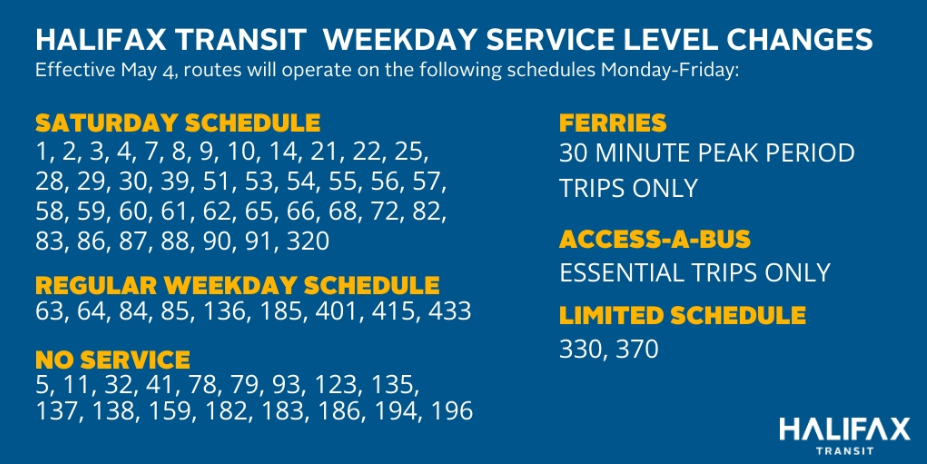As a new reduction in Halifax Transit service comes into effect, the union representing the area’s transit workers says anxiety among bus drivers has reached an all-time high.

Since the start of the COVID-19 outbreak in Nova Scotia, the public transit provider has gradually scaled back service to prevent the spread of the deadly virus.
READ MORE: Another employee tests positive for coronavirus at Burnside transit garage
The head of the Amalgamated Transit Union Local 508 says the changes — combined with fewer operators available to accommodate them — have brought “unprecedented” stress and distraction to drivers.
“This is the worst I’ve ever seen this membership. I’ve been here 22 years and their president for over 10,” president Ken Wilson told Global News.
“They’re anxious, they’re worried about their families and their passengers… It’s unprecedented territory to be honest.”
According to Wilson, service reductions have pushed more bus drivers onto a stressful, unpredictable six-day work rotation called “the spare board.” That’s where workers end up, he explained, when all the shifts have been picked up by workers with more seniority.
READ MORE: Halifax Transit reducing bus, ferry services as precaution against COVID-19
“Your work could change every day, you could be doing something different,” he said, “and for a lot of the newer membership they’re not used to doing this kind of work.

Get weekly health news
“(The spare board) makes it really challenging to try and schedule childcare and other personal things outside of the workplace.”
These new levels of anxiety come as the Halifax Regional Municipality confirms a fifth case of COVID-19 in a transit worker. New service reductions also went in effect on Monday, including a reduction in weekday routes, and the elimination of mid-day, evening and weekend ferry service.
It’s More Than Buses, a non-profit advocacy group for better public transit in Halifax, said it’s not as critical of service reductions as it is of the 17 routes that have been eliminated during the pandemic.
“There’s absolutely no precedent for having to do the job that Halifax Transit currently finds itself having to do,” said the organization’s chairperson, Scott Edgar.
“It makes perfect sense to reduce service to like, once every half an hour… but the routes that have been cut entirely seems to cut against the idea that we’re now thinking about transit as this bare bones essential service that’s going to serve, hopefully everybody it needs to serve.”
READ MORE: Nova Scotia confirms 1 new coronavirus-related death, 14 new cases
In an emailed statement, the Halifax Regional Municipality said it does not anticipate any additional service reductions at this time, but it will continue to monitor the situation and respond accordingly.
“Because this is a rapidly evolving situation, adjustments in transit scheduling must align with available staffing resources and ridership demands,” wrote spokesperson Erin DiCarlo. “These adjustments also result in changes to operational requirements and staff scheduling.”
She encouraged any public transit workers experiencing stress or anxiety during the pandemic to access their Employee and Family Assistance Programs for additional support, and raise any other concerns with their supervisors.





Comments